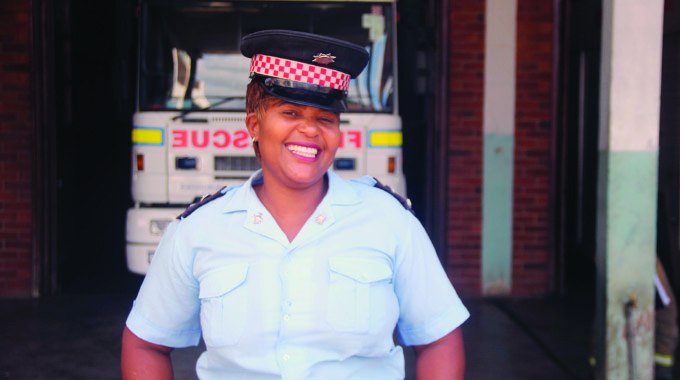Source: Women leading remarkable change in emergency services | The Herald
Grace Mahora and Lesego Valela
Zimbabwe has since independence in 1980 made remarkable achievements in empowering women in various sectors, including those dominated by males.
The country’s supreme law, the Constitution, is clear when it comes to women’s rights. The Constitution provides for gender equality and the rights of women and men to equal opportunities in political, economic, cultural and social spheres.
This has resulted in jobs opening up in professions that were previously male-dominated.
As part of the commemorations of the women’s month, The Herald today is celebrating women in the emergency service sector. These women have fought for major social change, rising to the upper echelons of traditionally male-dominated institutions, becoming leaders in the emergency services sector.
The women, who have taken up fire and emergency leadership roles, are a living testimony to the country’s commitment to increasing inclusivity and to achieve gender parity across the professions.
Agnes Chinzvende
Station officer Agnes Chinzvende (40), a fire fighter at Harare Fire Brigade, is an example that women have the same capabilities with men, as she was promoted to become Station Officer after passing international and national examinations. She grew up in a family and society where women were treated unfairly.
Chinzvende at first experienced a hard time in sharing the same duties with men as a fire-fighter.
“It’s not easy being a fire-fighter as the job is too risky,” she said.
“It requires bravery and passion. Most of the time the job involves rescuing people in serious incidents. You see dead bodies and badly injured people.”
Chinzvende encouraged women to continue standing for their rights and strive for what they want in life in line with the 2022 national women’s day theme: “Gender Equality Today for a Sustainable Tomorrow.”
“Women need to be strong and take up positions in male-dominated sectors. We must not be afraid to work in male dominated jobs,” she said.
Portia Moffat
Portia Moffat achieved her dream job of being an ambulance technician within the Harare Ambulance Department.
This is a job that requires bravery as she arrives at the scene immediately, makes decisions regarding the state of the injured and provides appropriate treatment. Serving in the field for five years, Moffat experiences different incidents which require her bravery.
In horrific accidents, she has to be strong and brave to undertake the daunting task of saving lives.
“I find it exhilarating to help someone in a critical condition, especially pregnant mothers about to deliver their babies. Helping them to deliver safely is fulfilling. The joy that the mothers radiate gives me hope about the nature of my job,” she said.
Moffat says women are more attuned to handling delicate and sensitive emergency cases. They have the right emotional state of mind to do such emergency care work.
Gunda Grace
Grace Gunda (49), a hearse driver at Nyaradzo Funeral Services in Harare, says she was inspired the day she met a lady who was driving a hearse.
Armed with 12 years of experience, Gunda has handled diverse bereavement cases, in some cases handling highly emotional people who could not easily come to terms with loss of loved ones.
She does body removals, washing and dressing, apart from being a hearse driver. Gunda demonstrated her bravery and dedication to her work by handling bodies of people who would have succumbed to Covid-19.
She was there at the peak of the Covid-19 crisis, serving with courage and dedication at the Parirenyatwa Red Zone.
Despite the loss of workmates, she never thought of quitting her job.
The most memorable event she encountered recently was at the funeral of a four-month-old baby with visually impaired parents who had to touch the corpse in order to confirm it was their baby.
“I was so touched by this case. It cannot get out of my mind easily. Every now and then, I have flashes about this sad and touching moment,” she said.
Makiwa Luwiza
Gallant women still exist in our country through their careers, and one of them is Luwiza Makiwa (42), a mortician at Nyaradzo Funeral Services.
Her job involves preparing and dressing the dead who are strangers to her.
One of the memorable events she encountered was preparing and dressing a body that had been burnt. As a mortician, she supports people during their darkest hour by dressing bodies, a task many fail to do during times of grief.
Makiwa encourages women to strive and achieve their dreams no matter what people say about their choice.
“At first I didn’t want to be a mortician due to societal beliefs – that often discouraged women from taking up such challenging tasks,” she said.
“I took up this job because when my parents died, I didn’t get the chance to view their bodies. This tormented my soul and I had to take up this role to gain psychological fulfilment and heal my wounds.”
Makiwa works in a male-dominated environment and feels strongly that Nyaradzo Life Assurance Company has registered tremendous success in promoting gender parity and inclusivity.
As we celebrate women’s month, we applause all the women who are leading from the front in male dominated fields.

